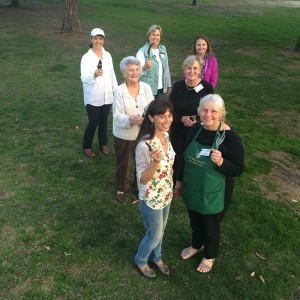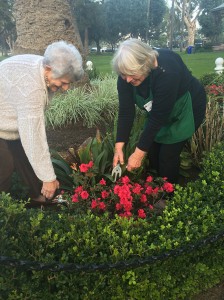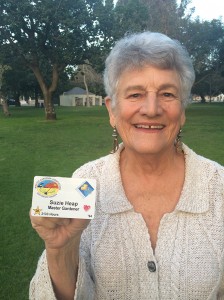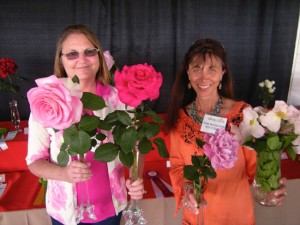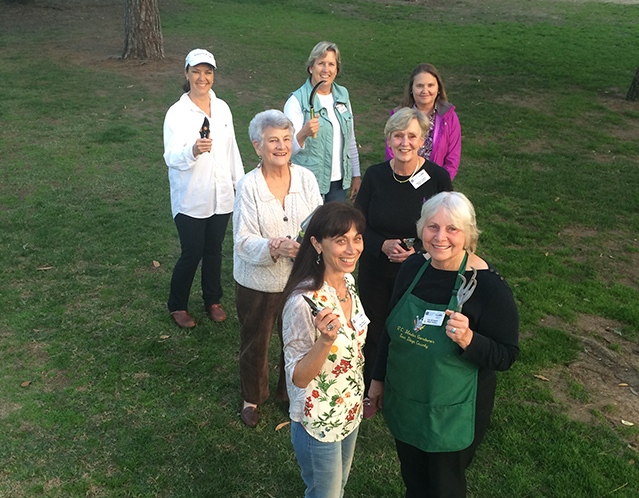It’s not quite spring in Coronado until the big white tents have taken over Spreckels Park for the annual Coronado Flower Show — where you’ll find elaborate floral arrangements, fragrant prize roses on display, exotic and unique plants, artistic children’s entries, live entertainment in the gazebo, a wine and beer garden and much more.
What began in 1922 as an effort by Coronadans Maude and Harold Taylor to build community and neighborly camaraderie is still thriving in its 90th year. The event will be held Saturday, April 18 and Sunday, April 19. The event is open to the public, and admission is $5.
In addition to the many vibrant exhibits and entries, guests can visit the Master Gardeners’ booth — where Coronado’s leading experts in all things flora can offer solutions and answers to gardening questions.
Coronado’s Master Gardeners spread the seeds of horticultural knowledge
By Jade Belzberg
Coronado has eight master gardeners — all have gone through an extensive program of instruction through the University of California Cooperative Extension (UCCE). Coronado master gardener Leslie Crawford noted that only 45 of the roughly 200 applicants who applied with her in 2010 were accepted for the elite gardening program founded in 1983.
Longtime Coronado resident Suzie Heap, a master gardener since 1994, explained that the university looks for people who not only have a love of gardening but are also eager to interact with the public, often evidenced by their past volunteer experience. Applicants don’t need to be experts in gardening, Heap noted, but she added with a chuckle, “We also love it if you have a truck!”
“We’re really a business — there are about 300 of us, and we do a lot,” said Heap, who has logged more than 2,000 hours of volunteerism and experience as a master gardener, though she began gardening long before her certification — beginning with a World War II Victory Garden at her Coronado house. She even has a fruit-producing orange tree from 1938.
In addition to an extensive paper screening, the application process includes an interview with three experienced master gardeners. In order to maintain the certification once it’s awarded, a minimum of 12 educational hours and 25 volunteer hours (six of which must be through direct contact with the public) must be completed each year. Educational hours can include public meetings, seminars and events. Volunteer hours can include volunteering at such events as the Coronado Flower Show (where the master gardeners have a booth and staff many of the areas of the Flower Show), staffing the master gardener hotline or working with schoolchildren
Master gardeners also produce an annual plant sale in Balboa Park, assist with the Balboa Park Botanical Garden (the distinctive lath building overlooking the lily pond), build and maintain school and community gardens, and staff various gardening exhibits throughout San Diego. Heap noted that one of her favorite projects is working with incarcerated youth, teaching them how to garden. “They learn about healthy eating,” said Heap, “which is a first for many of them. It’s very rewarding for them and for us.”
Master gardeners also host an annual Spring Seminar, held March 21 this year, at the County of San Diego Operations Center for the public to learn about a multitude of horticultural topics.
Master gardener Beverly Flather went through the program in 2005 and volunteers at the Mission Valley Agriculture & Natural Resources Cooperative Extension of San Diego County. This is where the master gardeners of San Diego meet monthly and where the hotline is based.
Carvill Veech, like Heap, a master gardener since 1994, emphasized that advice dispensed via the hotline is based on scientific fact, not old wives’ tales. “As agents of UCCE, we follow their guidelines in only giving out science- and research-based information,” Veech said.
Flather noted that when she went through the program in 2005, there were few gardening resources available. “We didn’t even have Google,” she said. “But now, even though there are a lot of resources on the Internet, we still get a tremendous amount of calls and drop-ins at the office.”
Master gardeners are taught to use sustainable and environmentally friendly methods in their gardening practice. Heap noted, “The more I learned, the less I would ever use pesticides.”
Master gardeners Rita Perwich and Donna Crawley, who met through their work with the Crown Garden Club, garden organically and have worked together to bring gardens to the schools on the island. Both women went through the program under Heap’s tutelage.
In 2001, the pair turned their attention to Village Elementary, where they saw unused grass space and imagined raised beds where schoolchildren could learn how to produce healthy vegetables.
“It wasn’t easy but we made it work,” said Perwich. “We talked to the principal and city council, got parents involved, raised donations and got a grant from master gardeners.”
For several years, each first grade class had their own garden bed to tend, and fourth grade classes studying the California missions subsidized classroom lessons by planting produce that would have been grown during the mission days. The raised beds have since been replaced by artificial turf, said Perwich, but many of the master gardeners would like to see a renewed interest in gardening at the schools.
The joy of gardening isn’t just for young folks, but for seniors, too, Crawley added. Now she and Perwich are helping to design and implement gardens at Coronado Retirement Village. “We go once a month to help put together arrangements for their rooms and dining halls,” said Crawley. An herb garden, used to garnish and flavor meals served at the Village, has also been added.
The pair also staffs the rose section of the Coronado Flower Show, organizing and supervising the extensive set-up and judging.
Throughout the Flower Show weekend, Perwich and Crawley will be on hand in the rose section to answer questions about growing roses. “This is a great time to point out and educate people that roses aren’t hard to grow, and can be grown without the use of sprays,” Crawley explained.
In light of the California drought, Perwich and Crawley, among many others, have forgone traditional lawns for more water-wise gardening setups. Perwich opted for a rose garden. “Roses aren’t hard. They need sun and food and a bit of pruning, but a little care goes a long way. They add so much color to your garden — and why waste water on grass when you can have roses?” she said. She installed a drip system — a much more economical and effective way to water, she noted.
Crawford, who received her certification in 2010, writes a popular gardening blog, titled 3000Tomatoes.com (named after one of her wildly successful tomato harvests). She also enjoys gardening with succulents and suggests that a variety of them can thrive on the island. “Water use is always going to be an issue here, and we all need to do our best to conserve where we can. But that doesn’t mean our yard needs to look dried out or desert-like,” she said. “Drought-tolerant plants love this climate. And succulents especially are beautiful and fascinating.” Some of her favorites include Cleveland and Mexican sages, rockrose, Mexican marigold and aloes.
Veech is also no stranger to gardening in Southern California’s dry environment. Her love for gardening bloomed when she first moved to Coronado in 1989 and decided she’d garden “just until it rained.”
“For two years it never rained enough for me to take a break!” she said.
And Molly Coumes, who lives next door to Heap and completed the program with Crawford five years ago, is another master of her trade who has also become invested in growing produce; Coumes’s specialties include lettuces, kale and radishes.
Surprisingly, Coronado gardeners will find a number of microclimates on the island, depending on the orientation of their house to the sun and the amount of shade in the surroundings, all of which lead to numerous landscaping options.
“We live in a coastal environment so we don’t get the more extreme temperatures that are only a few miles inland,” Crawford said. “So almost anything will grow here. But, for instance, certain tomatoes that don’t require super hot temperatures do better here than others that really need the heat. We can grow a large variety of fruit trees here as well as blueberries, but make sure to look for low-chill varieties since we don’t get the deep cold that many trees need to produce fruit.” Crawford further advised that any reputable nursery can help identify proper plants for our coastal climate.
When it comes to her personal gardening philosophy, Crawford said, “Gardening is all about sharing. I trade succulent cuttings with people, and I love talking to people who have questions about my — or any other — garden. Gardening is universal, ever-changing, and always interesting.”
And with around-the-clock expertise of more than 200 San Diego master gardeners available to the public for free, this group of green thumbs hopes to keep good things growing here well into the future.
Got gardening questions? Be sure to stop by the Master Gardeners’ booth at the Coronado Flower Show on Saturday, April 18 between 1 and 5 p.m. or Sunday,April 19 between 10 a.m. and 4 p.m.
San Diego Master Gardeners
HOTLINE:
(858) 822-6910,
Mon.-Fri., 9 a.m.-3 p.m.
DROP INS:
9335 Hazard Way
San Diego, CA 92123
